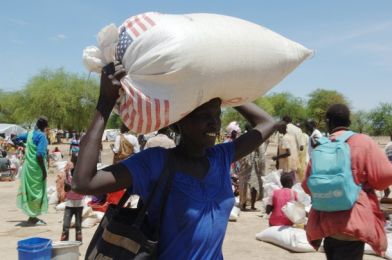South Sudan denies appointing new Abyei administration
August 23, 2012 (JUBA) – South Sudan has denied it is has “unilaterally” appointed a new administration for Abyei, the contested oil region on the border between Sudan and the South which broke away last year.

Kur, who is the deputy chairman of the Abyei steering committee in Khartoum told Sudan’s official new agency – SUNA – that the Sudanese presidency has directed the members of this panel, appointed by President Omer Al-Bashir after the seizure of the area in May 2011, to travel to the disputed territory and to resume its activities.
Members of the steering committee, headed by Ahmed Hassan Al-Imam, are preparing to go to Abyei, he said.
However, Juba has dismissed the allegation that it acted unilaterally, claiming that it only asked for civil servants appointed in agreement of the two sides to return to the area to help facilitate the repatriation process of the returning internally displaced persons.
Over 100,000 people were displaced when the area was occupied by the Sudan Armed Forces shortly before South Sudan’s independence in July 2011. The two sides are due to resume talk on outstanding issues from South Sudan’s secession over the next few days.
So far, discussions between Sudanese and South Sudanese teams at the African Union mediated process in Ethiopia have failed to form a new administration in line with the Temporary Arrangements for the Administration and Security of the Abyei Area (TAASAA) signed on 20 June 2011.
“We did not appoint [a] new administration but we rather asked the civil servants appointed by the national government before the invasion of Abyei to return to Abyei town to assist in the return”, Luka Biong Deng, a Co-Chair of Abyei Joint Oversight Committee, representing South Sudan President Salva Kiir Mayardit said on Thursday.
Biong said that civil servants returning to Abyei are the same civil servants that were present in the before the invasion of Abyei on 21 May 2011 by the Sudan Armed Forces (SAF). The Sudanese military say their actions were triggered by an attack on a UN accompanied SAF convoy leaving the area.
“These are the same the same civil servants approved by the National Ministry of Finance and Presidency in Khartoum. If they wish they can check with us the list of these civil servants”, he said.
The leading figure of South Sudan’s governing SPLM, warned that “any attempt by government of Sudan to bring their own civil servants to the area who are not previously part of Abyei[‘s] civil servants will certainly amount to conflict and [we] will not be part of such move”.
He further added that there was a need to look for an effective way of bringing back to the area some of the civil servants initially part of Abyei administration, approved by the then Government National Unity in Khartoum, which consisted of members of the NCP and SPLM. After South Sudan voted to secede in January 2011 the unity government was dissolved ahead of South Sudan’s independence six months later.
This issue of Abyei was due to be resolved through a referendum occurring at the same time as South Sudan’s independence plebiscite. However, differences over voter registration meant the referendum has been postponed indefinitely, while the two sides cannot agree on who should be allowed to take part.
South Sudan wants the nine chiefdom’s of the Dinka Ngok to be the only people allowed to vote, arguing that they are native to the area. However, Khartoum wants the Misseriya, an Arab nomadic tribe, to be able to take part as many of them enter the area to graze their cattle for some months of the year.
“This needs to be carefully done in order to avoid tension and [a] prevailing level of trauma among Ngok Dinka so that it does not allow return of the very people who participated in the devastation of their area coming back to administer it or assist in their return”, Biong said.
He asserted that the government of Sudan continues to illegally keep its forces in Abyei area while deliberately failing to sign the Status of Forces Agreement, for the UN peacekeeping presence in the area.
“The government of Sudan did not only refuse to withdraw its forces in Abyei but also unwilling to transfer 2% of oil revenue [to] the Ngok Dinka and unwilling to sign the joint letter to two heads of state that was agreed upon”, he said
The official charged that Sudan decided to turn down the Terms of Reference of the Inter-Governmental Taskforce for humanitarian assistance that was agreed upon by the joint humanitarian team and had insisted on Khartoum enforcing its laws and its sole sovereignty over Abyei.
“All these actions are meant to discourage the return of Ngok Dinka to their home areas”, he said.
(ST)
